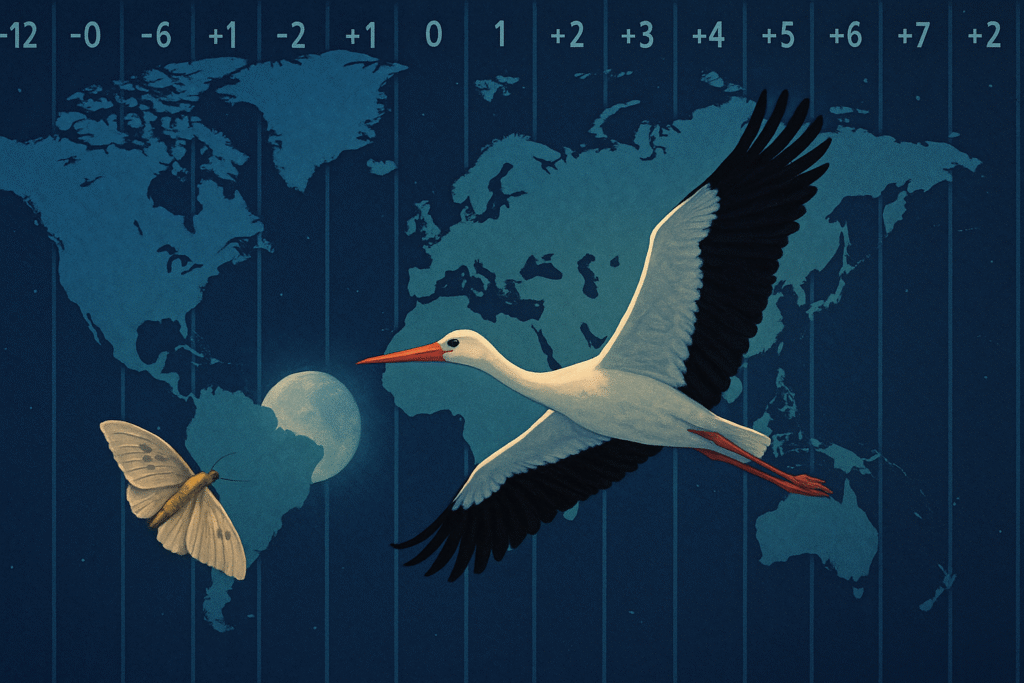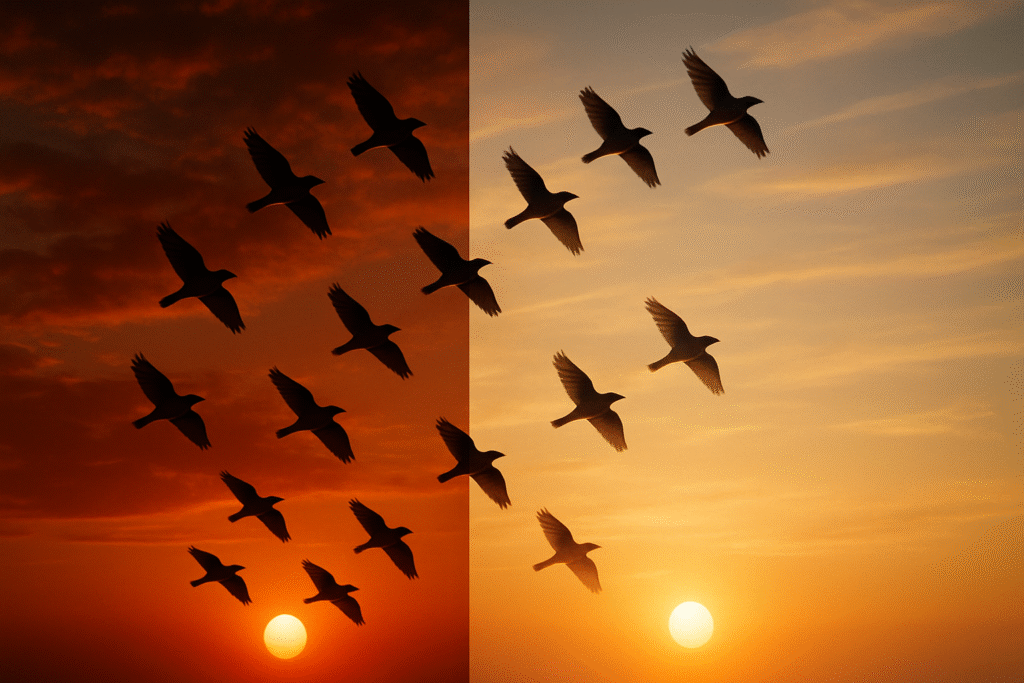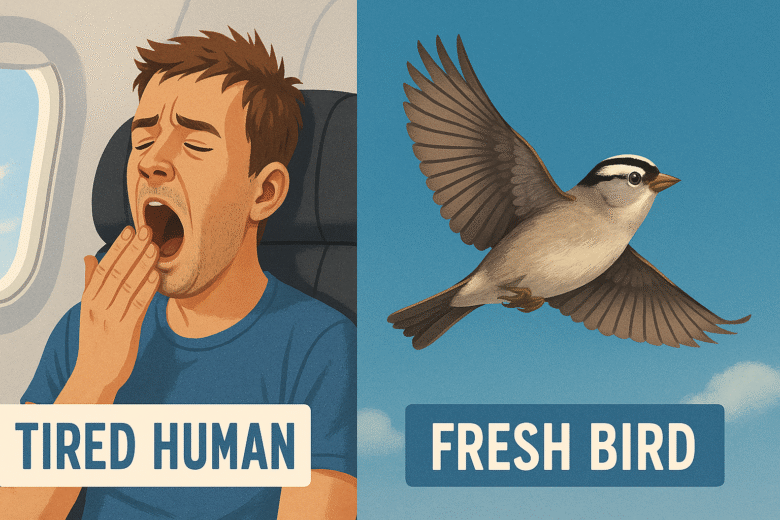Fun fact: Some migratory birds can fly thousands of kilometres across multiple time zones—and still arrive perfectly alert and oriented.
If you’ve ever stepped off a long-haul flight feeling like your brain’s been scrambled, you’re familiar with jet lag. That disoriented, sleepless, coffee-fuelled blur? It’s your internal clock being very unhappy. Now imagine doing the equivalent of 10 or even 20 time zones—not in a pressurized cabin with snacks and movies, but on muscle power alone. That’s what migratory birds do every year. And they don’t seem the least bit jet-lagged.
So what’s their secret? Why don’t birds get jet lag, but you do? In this blog, we’ll explore what birds are doing right, how their bodies handle time travel better than ours, and what that tells us about sleep, adaptation, and resilience.
Jet Lag: A War Between Body and Clock
Let’s first understand jet lag.
Jet lag is a type of circadian rhythm disruption that happens when your internal body clock gets out of sync with the external environment. You’re in New York, but your body still thinks it’s in Mumbai. Light exposure, hormone release, digestion, and sleep cycles all go haywire.
Symptoms? Fatigue, insomnia, brain fog, irritability, and even digestive issues.
Your circadian rhythm (internal clock) is regulated by a part of the brain called the suprachiasmatic nucleus (SCN). This clock syncs with the sun, adjusting slowly—usually about one hour per day. That’s why flying from Delhi to London feels rougher than driving from Delhi to Jaipur.
But birds? They fly across continents with grace, rhythm, and astonishing precision.
The Long-Haul Flyers of Nature
Bird migration is one of the greatest endurance feats in nature.
- Arctic Terns travel over 70,000 kilometres annually from the Arctic to the Antarctic and back.
- Bar-tailed Godwits can fly nonstop for 11,000 kilometres over eight days.
- Blackpoll Warblers weigh about as much as a ballpoint pen and still manage a transatlantic flight.
That’s not just impressive. It’s nearly superhuman. And it begs the question: how do they manage time, fatigue, and orientation?
What Science Says: Birds and Circadian Rhythm
Recent research reveals that birds, too, have internal clocks—but theirs are far more flexible and complex.
Multiple Clocks, Not Just One
Unlike humans, who rely mainly on the brain’s SCN, birds have distributed circadian systems. Their eyes, pineal gland, and even peripheral organs all contribute to timekeeping. This redundancy allows birds to better adjust to shifting environments.
Inbuilt Light Sensitivity
Birds are extremely light-sensitive. Their exposure to sunlight while flying at high altitudes helps recalibrate their biological rhythms much faster. Essentially, their “body clocks” are more responsive to environmental cues.

Controlled Sleep
Some birds engage in unihemispheric slow-wave sleep (USWS)—where one half of the brain sleeps while the other stays awake. This allows them to rest during long flights without losing awareness.
Some even take “micro-naps” while gliding—just seconds long, but enough to reduce fatigue.
Case Study: The White-Crowned Sparrow
Researchers at the University of Wisconsin studied the White-crowned Sparrow, which can fly long distances without showing typical signs of sleep deprivation.
When these sparrows were sleep-deprived in a lab setting, they performed better on cognitive tasks during migration season than at other times. Their brains essentially resisted the usual negative effects of a lack of sleep.
This suggests that migratory birds have evolved seasonal brain states that buffer them against circadian disruption.
Why You’re Not a Bird (Sadly)
As much as we’d like to upgrade our bodies to bird-like resilience, we’re stuck with slower, more rigid systems.
- Our circadian rhythms are anchored to strict light-dark cycles.
- We cannot engage in unihemispheric sleep.
- Our cognitive function declines significantly with jet lag.
- And worst of all? Artificial light and screen exposure make everything worse.
But there’s still hope. Understanding how birds do it could inspire better jet lag treatments, shift-work management, and even astronaut sleep schedules.
Do Birds Get Jet Lag At All?
The short answer: Yes, but it’s rare and short-lived.
In some experiments, birds exposed to artificial shifts in light cycles do show temporary disorientation. But in the wild, their biological systems adjust so quickly that it doesn’t resemble human jet lag.
Their natural behaviours—like pre-migration fattening, muscle adaptation, and strategic resting—also help them cope better than we can.
Nature didn’t just give birds wings. It gave them circadian superpowers.

What Can Humans Learn From Birds?
Here are a few takeaways:
- Light is medicine: Natural sunlight in the morning helps reset your internal clock faster after travel.
- Movement matters: Birds don’t sit for hours—they’re moving constantly. A walk or stretch after landing can help speed up the adjustment.
- Sleep smart, not long: Strategic naps, not binge sleep, might be more helpful.
- Anticipation helps: Like birds preparing for migration, adjusting your sleep schedule before travel can reduce jet lag.
And perhaps most importantly—don’t fight biology. Work with your rhythm, not against it.
Conclusion: Grounded Humans, Soaring Clocks
So why don’t birds get jet lag, but you do?
Because birds evolved with time zones in their DNA. Because they fly with the sun, sleep with one eye open, and live according to rhythms we’re only beginning to understand.
Meanwhile, we stare at our phones until 2 AM and wonder why we feel like zombies in a new country.
Birds aren’t just travellers. They’re timekeepers. They move not just through space, but through biological time—flawlessly, beautifully, and silently reminding us that nature always has a better plan.
Author’s Note
This blog was born on the tarmac of a delayed red-eye flight. Watching a bird glide by the window made me wonder: why do I feel like death after five hours in the air—and that sparrow looks fresh as ever? Turns out, the answer is both humbling and oddly hopeful.
G.C., Ecosociosphere contributor.
References and Further Reading
- Science – The Sleepless Migratory Bird
- BBC Future – Why Birds Don’t Get Jet Lag
- National Geographic – Bird Brain Power During Migration
- Why does jet lag occur?. https://education-academia.github.io/ap-psychology/Biological-Bases-of-Behavior/Biology-of-Consciousness/why-does-jet-lag-occur.html
- Jet Lag Survival Guide: How to Beat the Fatigue and Stay Refreshed While Traveling – Flight93. https://flight93.org/jet-lag-survival-guide-how-to-beat-the-fatigue-and-stay-refreshed-while-traveling/
- Blog Archives. https://www.brainreach.ca/blog-en/archives/12-2018




